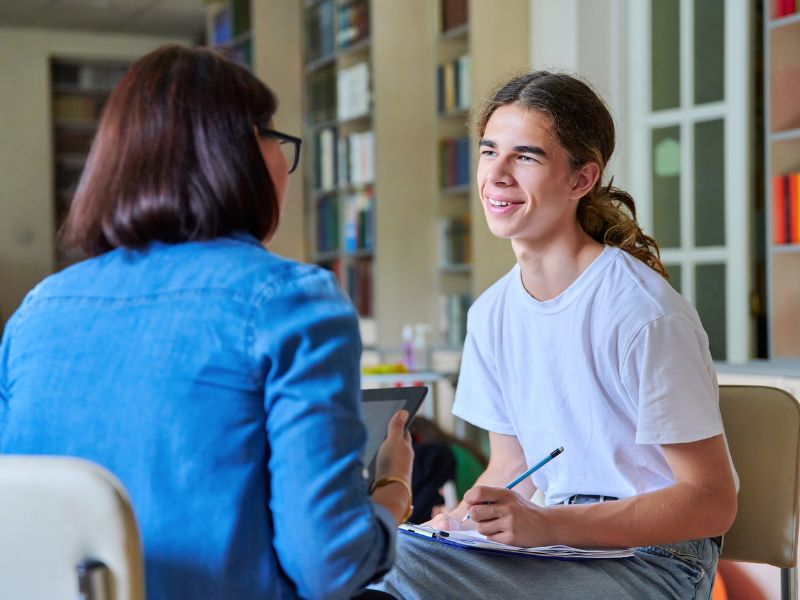5 Tools to Improve Focus for Teens With ADHD
“I got detention for forgetting my book three times in a row,” read Michael’s text. His mother wasn’t surprised. Michael was diagnosed with ADHD when he was 8 years old, and she’s received other messages saying he misplaced or even forgotten to do his homework. His mother hoped that he’d be more organized by 13, and she wonders if this is typical teenage behavior or if it’s due to his ADHD.
“Everyone has ADHD behavior at times,” says Dr. Sarah Cheyette, a pediatric neurologist and co-author of the book, “ADHD & The Focused Mind: A Guide to Giving Your ADHD Child Focus, Discipline & Self-Confidence.” Cheyette says the difference between a person with ADHD and other people is that the person with ADHD is unfocused too much of the time.
“There are differences between a child and a teen with ADHD,” Cheyette says. When a younger child has ADHD, parents tend to be more forgiving and helpful with their unfocused behaviors. A teen with ADHD may want their independence but lack the skills to focus and control their impulses. This can lead to more severe consequences than when they were younger. However, parents can help their teens with ADHD improve their focus.
1. Positive thinking
When a teen is interested in doing a particular task, it will be easier to accomplish. “Most people become more focused when they decide they want to do something,” says Cheyette. “If you say to yourself, ’I don’t feel like doing this,’ then you probably won’t.” For example, if your teen doesn’t like doing homework, encouraging them to change their mindset can help improve their focus. Reframing the negative thought (“I don’t want to do my homework”) in a more positive light (“Finishing my homework will make me feel good about this class”) can help a teen become more focused and complete the task.
2. The right surroundings
Emily, a parent of a 14-year-old son diagnosed with ADHD, has found that choosing the right environment helps her son’s mindset. “I encourage him to stay after school to do his homework,” she says. “This way he doesn’t become distracted by things at home, like his phone, and he can receive help from his teachers.”
3. Healthy lifestyle choices
Cheyette also stresses the importance of a healthy lifestyle for improving and maintaining focus. Eating healthy, getting enough sleep and making time to exercise can all contribute to improved focus for teens with ADHD. Sleep problems can lead to issues with memory and impulse control for any child, but especially kids with ADHD.
Jen, a parent to a 12-year-old daughter diagnosed with ADHD, agrees with Cheyette about the importance of eating healthy and getting enough sleep. Her daughter experiences intense mood swings and an inability to deal with stress when she doesn’t eat or sleep well.
4. Setting goals
Cheyette says that setting goals can help teens with ADHD improve their focus and achieving their goals will help them feel successful. As a parent, you may be tempted to provide directions or nag your child to make sure they are working towards their goals, but it’s important for teens to actively set and own their goals.
But you can still help them. “Make observations and ask questions,” Cheyette recommends. “If you notice your son’s backpack is a mess, instead of saying, ‘You need to organize your backpack,’ try saying, ‘It must be difficult to find your homework when your backpack looks like this’ or ‘How are you able to find your homework?’”
Once you’ve framed the problem, she says, “Ask questions such as, ‘How can you help yourself?’ or ‘How can you act differently next time?’ to allow your child to think about and own their behaviors.”
5. Medication
Like younger kids, teens can benefit from medication. Amy, a parent of a 15-year-old son diagnosed with ADHD, bought her son a trampoline to use after school to help him release his energy. And the exercise was helpful. But she saw the most improvement when her son began taking medication. “Once he was medicated he could use self-regulating strategies,” she says. “Before that, he wasn’t able to learn these strategies since he couldn’t pay attention.”
Cheyette wants to remind parents that you are your child’s best advocate and the parents interviewed here agree. “The best advice I can give other parents is to tell them that there may be really bad times, but your child needs to know that you are in their court,” Jen says. “When your child feels like a failure or has no friends, or school is horrible, they need to be able to come home to you and release their frustrations and emotions.”
Related
21 People Who Succeeded Despite a Learning Disability
What a Child With Dyslexia Can Teach Us

